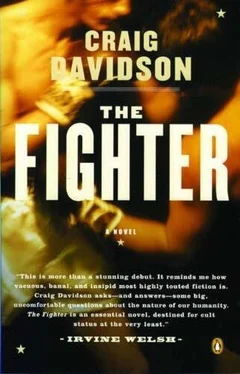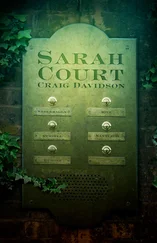“Who?” he wanted to know.
“I don’t know,” Reuben said. “Some guy. A kid. Never even seen him before.”
“What do we do?”
“Nothing else to be done. We wait and see.”
The hospital surged: nurses hustled down the halls in response to code greens and yellows and blues; orderlies ran cases of blood mixture to the dialysis ward; a janitor guided a doodlebug over the floor. Few paid any mind to the man and boy sitting on the bolted orange chairs. Their tragedy, whatever it might be, was unexceptional.
The taxi eased through the wrought-iron gates, following the drive up to Paul’s parents’ house. A taste of early spring: stalactite-thick icicles dripping on the eaves, patches of brown lawn under the melting snow.
Last week a letter from a local barrister’s office was delivered to the boxing club.
Paul’s uncle Henry had passed, it informed him; the will was to be read next week at his parents’ estate, and could he please attend.
He checked himself in the cab’s side-view mirror. A twisting slash on his cheek was healing badly, its puffed edges the same blue-black as a dog’s gums. He hadn’t slept well since the fight, suffering nightmares in which he fought great shadowy shapes the height of power poles that came at him with barbed-wire fists.
Three people sat in the living room: his father and mother, plus a young man dressed in wool pants and sweater. The estate lawyer, Paul assumed. His parents held recipe cards, as if they’d prepared speeches.
The young man motioned to a straight-backed Tiffany chair. “Paul, please take a seat.”
“It’s a shame about Uncle Hank,” Paul said, sitting.
“What got him — high blood pressure? Lord knows he loved his salty snacks.”
“Your uncle is alive and well.” The young man spread his palms, an apologetic gesture. “Max Singleton, Paul. I’m an interventionist.”
“Oh, this is cute.”
“Calm down.” Singleton’s air was that of a scientist handling a highly unstable element. “We’re just here to talk, Paul.”
“Does Uncle Hank know about this subterfuge?”
“That’s neither here nor there,” Max the Interventionist said. “Your parents are worried, Paul. The situation is grim, maybe, but not beyond hope. This afternoon you’re in range of death; tomorrow you can be in range…” —dramatic pause — “… of life ”
“Seriously?” Paul appealed to his folks. “This guy is serious?”
“We’re here to help, Paul,” Singleton went on. “Will you let us do that, Paul — will you let us help?”
Paul didn’t care much for the constant repetition of his name; must be a tactic they taught at the Interventionists’ Academy. “Ah, what the hey.”
Barb Harris, demure in a black silk blouse, snatched a Kleenex from a box on the coffee table. “Don’t be so flip, Paul.” Jack Harris sat beside her in a charcoal-gray suit. They looked like a couple of funeral mourners.
“Mr. Harris,” Singleton said. “Start us off.”
Jack shuffled his recipe cards and swallowed. Paul noted the sunken rings around his father’s eyes, the four-day growth of beard.
“Son, I always thought we were decent parents and made the right choices more often than not, but clearly we’ve let you down in some critical way. I’ve watched you fall apart and cannot for the life of me figure out why. There seems to be nothing I can do to help — you won’t let anyone help. I’m afraid for you, Paul. Deeply afraid.”
“Oh, come on—”
“You seem to believe I wanted you to follow in my footsteps… and maybe, thinking back, okay, I did want that. But I don’t care now — you don’t want to work at the winery, fine. Do anything you want, just so long as you’re safe. I mean that. Absolutely anything.”
“But…”
Singleton prompted.
“But you’ve got to quit this self-destructive quest you’re on. This… jihad. You need help, son. A car is outside — will you let us take you someplace so you can get better?”
“What, you got the paddy wagon waiting? Men in white coats ready to chase me across the lawn with butterfly nets?”
Singleton made a motion as though he were tamping down a patch of soil — calm down, Paul, calm down. “Mrs. Harris,” he said, “you go on.”
“Paul, I want to let you know how much I love and admire you. But I’m scared that if you don’t stop this abuse and turn yourself around you will not be with us much longer. I can’t stand thinking you are not in a safe place; whenever the phone rings in the night I’m terrified it is about you, telling me you’re dead. So please, Paul, give me back the wonderful and caring son of whom I’ve always been so proud. A car is waiting outside — will you please accept the help that is being offered and get treatment today”
“This car,” said Paul, “where would it take me?”
“The treatment center is top-notch,” Singleton assured him. “A secluded country estate, rambling meadows, cool valley streams, a four-star chef…” Paul thought Singleton would whip out a brochure. “… the best specialists trained in the treatment of various mood disorders—”
“Are you gay?” Barb blurted. “Is that it, Paul? You feel passionate for men?”
“What your mother’s trying to say,” said Singleton, “is that sudden interest in hyper-masculine activities is frequently indicative of a latent homosexual drive.”
“The posters in your room,” his mother went on. “Those… surfing posters.”
“So, what, being gay is a mood disorder ? Are you gonna cart me off and straighten me? Would it be better if I was gay — I mean, would it make this any more palatable? Okay, fine, I’m gay. Gay as a French foreign legionnaire!”
“See?”
Barb spread her hands, apologizing for her son’s behavior the way she might for a senile dog with a penchant for biting the mailman. “It’s like I said — he’s disturbed.”
“Oh-ho-ho!”
Singleton gave a ghastly chuckle, the chuckle of a man who’d just witnessed a ten-car highway pileup and was trying to wring a drop of hope from the tragedy.
He cast his soothing gaze upon Paul. “Nobody’s disturbed here, are they?”
“What do I know? You’re the professional.”
“That’s right — I’m the professional. And I say nobody’s disturbed.”
“I’m sold,” Paul said amiably.
“Why are you doing this?” his father wanted to know. “Why take punches just to prove you can? Why suffer just to suffer? That’s how animals do it, Paul — no, animals have more sense.”
“Because…” Paul was staggered a bit by his father’s question. “… people need to suffer. People need to feel pain and experience want and get smashed apart if only to fix themselves.”
“Do you have any idea,” Jack said, “what you’re asking of us? A son asking his parents to let him go through hell in hopes he might come out of it a better man? Who says you’re going to come out better — who says you don’t come out scarred and irreparable? We can’t let you do that. It goes against every single parenting instinct; it goes against basic human nature.”
“And is it our fault?” Barb said. “Our fault you didn’t suffer enough? What should we have done — daily beatings to strengthen your constitution?”
“Mrs. Harris—”
“No, really, I’d like to know. Would you have rather we’d locked you in the root cellar, fed you bread and water — would that have been suitable?”
“Let your parents know how you’re feeling,” Singleton told Paul. “Let them in; together we can help.”
“Do any of you remember that killer whale, Friska?” Paul said after a moment’s consideration. “She performed at the amusement park down in Niagara Falls.
Читать дальше












